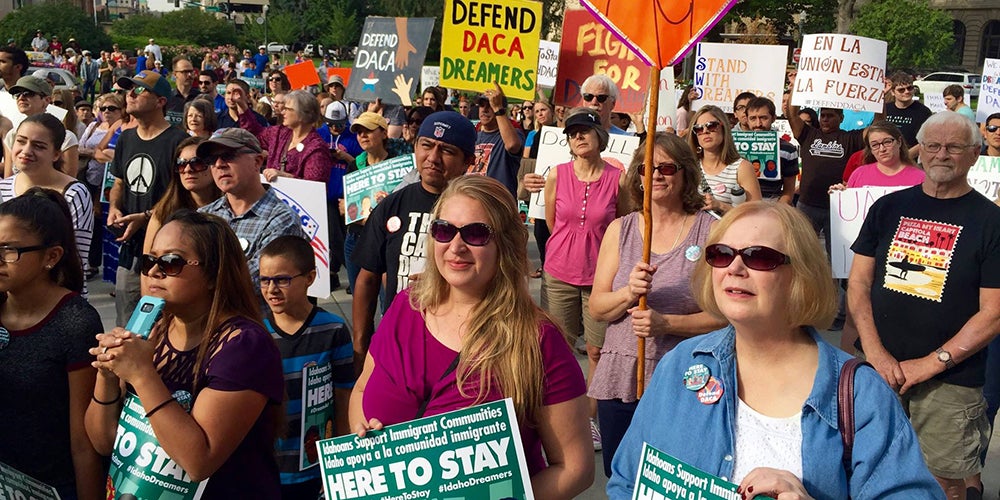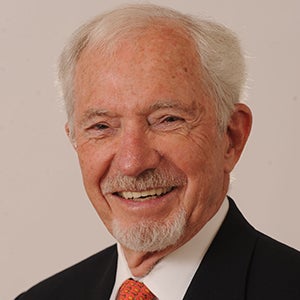
When I served as a legislative assistant to Frank Church in 1964, it was my responsibility to prepare the senator’s answers to mailbags full of letters about the Civil Rights Act, which was pending before the Senate. The senator’s white constituents had no particular reason to support equal rights, and a minority of letters raged in predictable fashion. Most memorable, however, was the flood of supportive and pivotal letters inspired by religious faith.
Black religious leaders demanded change, and Jewish, Protestant and Catholic leaders nationally joined them, but the way their messages came alive in the pews in places like Idaho made a critical difference. Many letters had multiple signatures, as if gathered at church events, while others expressed deep individual conviction. They helped swing or reinforce the vote in the Senate.
Those letters come to mind as I write about refugees and immigration 53 years later. What role will religions and faith-influenced individuals play on another great moral question: who gets to come to America, how are they treated and who is expelled? In particular, as Congress considers the fate of 800,000 Dreamers, might churches again tip the balance in their favor?
A September column in the Idaho Statesman titled “Why evangelical Christians are in favor of immigration reform” told of the tremendous growth of immigrants in evangelical churches, a good many of them Asian or Latino, many of whom are undocumented. Virginia Postrel, a columnist for Bloomberg, wrote that “a coalition of prominent evangelical groups called the Evangelical Immigration Table is ‘advocating for immigration reform consistent with biblical values including a path toward legal status and/or citizenship for those who qualify.”
The Church of Jesus Christ of Latter-day Saints (LDS) also supports comprehensive immigration reform behind protected borders, and in 2016 spoke out strongly against the discrimination of Muslim immigrants. In October 2015, the church called on its members to help refugees in the United States and overseas, drawing on their own shared history as immigrants facing persecution. As anyone involved in refugee work in Idaho will attest, the church’s new “I Was a Stranger” campaign has had an immediate positive impact on the ground.
Pope Francis has similarly instructed Catholics to take up a worldwide campaign called “Share the Journey” in support of refugees. Latino Immigrants have flooded Catholic parishes in southern Idaho, accounting for almost all of the church’s growth in recent years. About sixty percent of Latino immigrants are Catholic according to the Public Religion Research Institute. Catholic Charities of Idaho provides significant help to immigrants so that they comply with immigration laws.
Mainline Protestant churches also support immigration reform at the national level, as do many smaller or more local churches. Last summer, when the North End Collective, a small and relatively new Boise congregation, learned that a tight housing market was forcing new refugees to stay in motels, rapidly draining their limited funds, it helped rent apartments and purchase condos for their use while also providing hosts to help them settle in. One of two agencies that receive refugees in Boise, the Center for New Americans, was founded by Methodists and is still supported by the Methodist Cathedral of the Rockies. Cole Community Church is one of many Protestant churches that have supported the 24,000 refugees who have come to Boise since 1975.
Idaho is also home to Buddhist congregations, Muslim mosques and Christian communities made up primarily of immigrants, such as Bosnians, Romanians, Vietnamese and Koreans. At the Vineyard evangelical church in Garden City, a guide for the second Sunday service is written in Burmese as well as English. The congregation includes many Karen immigrants from Myanmar.
According to the Pew Research Center, evangelicals are now nearly equal in number to LDS, representing 21 percent of the population, compared to 19 percent LDS among adults. Protestants constitute 16 percent, Catholics ten percent and non-Christians four percent of Idahoans. Thirty-five percent of Idahoans attend church at least once a week, 37 percent do not attend church at all, while the rest fall somewhere in between. One-third of Idahoans look to churches and scripture for instruction on what is right or wrong, while 51 percent say they prefer “common sense.”
These statistics suggest that churches could substantially influence how Idaho’s representatives vote on protecting DACA youth. A larger question is would they try?
Churches vary in their willingness to take their convictions into the public arena. That said, a majority of Idaho legislators tell pollsters that religious values drive their decisions, even over state or federal constitutions. Evangelicals are now a significant political force eager to vote their convictions. LDS are the principal political leaders of Idaho today: Mormons hold three of the four top positions in the legislature, comprise three of the four candidates for governor in 2018, and half the congressional delegation. A majority of LDS are citizens of countries other than the United States, and a high percentage served two-year missions overseas, potentially building sympathy for “strangers” which may not found in other faiths. But taking a stand on specific legislation is another matter.
Evangelicals, LDS, Catholics, Protestants and smaller immigrant-centric religious communities seem to have the numbers and political power to push the Dreamer cause successfully. At a quickly called September 9 rally on behalf of the Dreamers – attended by nearly 1,000 people – religious support was evident.
Dreamers are likely to be Catholic, evangelical or unchurched; some also belong to LDS and other faiths. But Idaho had few black Americans in 1964. Churches are moved by their beliefs, not solely by the plight of their specific membership. People respond to those they know, not statistics. The annual Boise State public opinion poll reveals the difference: those who personally know or who have had contact with a refugee are much more inclined to be sympathetic.
There are 3,132 DACA youth in Idaho. They have legal status and are finding their voice, unlike their parents who are much more afraid of speaking out. Hispanic voter registration drives have had limited success. Hostility from President Trump’s administration could further suppress voting and activism. Judging from the September 9 rally for the Dreamers, however, this generation appears to be different, all the more so because they made the brave decision to trust the government when they came out of the shadows.
The most effective voice for Idaho immigrants thus far has come from the state’s agricultural sector, particularly the dairy industry, which is highly influential and highly dependent on undocumented Hispanic workers. Bob Naerebout, executive director of the Idaho Dairyman’s Association, has been an unambiguous advocate for immigration reform. He believes the Idaho Congressional Delegation is now well informed about the need to protect Idaho’s dairy workers.
Naerebout is also treasurer and a board member of the National Immigration Forum, which “advances the value of immigrants and immigration for our nation.” When I asked him about evangelical support for immigration reform in the west, the Forum helped put me in touch with Dr. Drew Campbell, Assistant Professor of Social Work at Northwest Nazarene University in Nampa. Campbell and the pastor of his church, Daniel Mangeau of Good News Community Church, have made the rounds of Idaho legislators to discuss immigration. They recently met with the staff of Congressman Labrador. Campbell says they often pray with legislators who are frequently people of faith and sympathetic, but they are also bound by the needs and preferences of their constituents.
Campbell notes that as a professor of social work he is not representative of a typical Idaho church-goer, many of whom are strongly influenced by conservative media, such as Fox News. Pastor Mangeau believes evangelical churches should take action in support of DACAs, but he says it is a toxic issue – advocates are frequently accused of being “liberals and not supportive of America.” Four years ago, Mangeau notes, the national Evangelical Immigrant Table was part of a coalition which came close to achieving immigration reform. Among its members were the Southern Baptist Convention, Assembly of God and the Church of the Nazarene. But since that near-miss effort, energy has waned, and the sentiment in the pews has changed.
Another prominent evangelical leader in Idaho is Dr. Tri Robinson, who founded the largest evangelical church in the Treasure Valley, Vineyard in Garden City. Vineyard runs a free health clinic, provides Sunday dinner to the homeless and is actively pro-environment. In his latest book, “Re-Form,” Robinson calls for the millennial generation to reform and revive Christianity that is too often affiliated with far right politics over “social justice, creation care and other ministries of compassion and justice.”
Today Dreamers need the support of others to remain in this country. If they stay, might they also be leaders in a revival of social justice, compassion and justice?
Few Americans realize that the Obama administration deported 2.5 million people, an extraordinarily large number. If Dreamers are expelled, as the Department of Homeland Security has told them to plan for, it will be the equivalent of deporting all the citizens of Pittsburgh and Omaha. For Idaho, it would be analogous to emptying the city of McCall. It is hard to imagine why America would pursue such a self-defeating move. Every country could use a cohort like this one: young, productive men and women with no criminal record, 97 percent of whom are working or are in school, who willingly pay taxes and will support the elderly for a generation. To expel them would not only be cruel, it would be economically senseless.
My experience in 1964 was more than just preparing letters. Because Church was one of six senate whips for the Civil Rights bill, I also worked directly with Senators Everett Dirksen and Paul Douglas to keep track of a dozen members in order to prevent a southern filibuster from succeeding. Today I remember coming down the senate steps after the Civil Rights Act passed as one of the great events of my life. May another such day come to pass when it comes to protecting DACA youth.

Jerry Brady is a fourth generation Idahoan who twice ran for governor. He was an assistant to Frank Church for eight years and publisher of the Idaho Falls Post Register for 25 years.